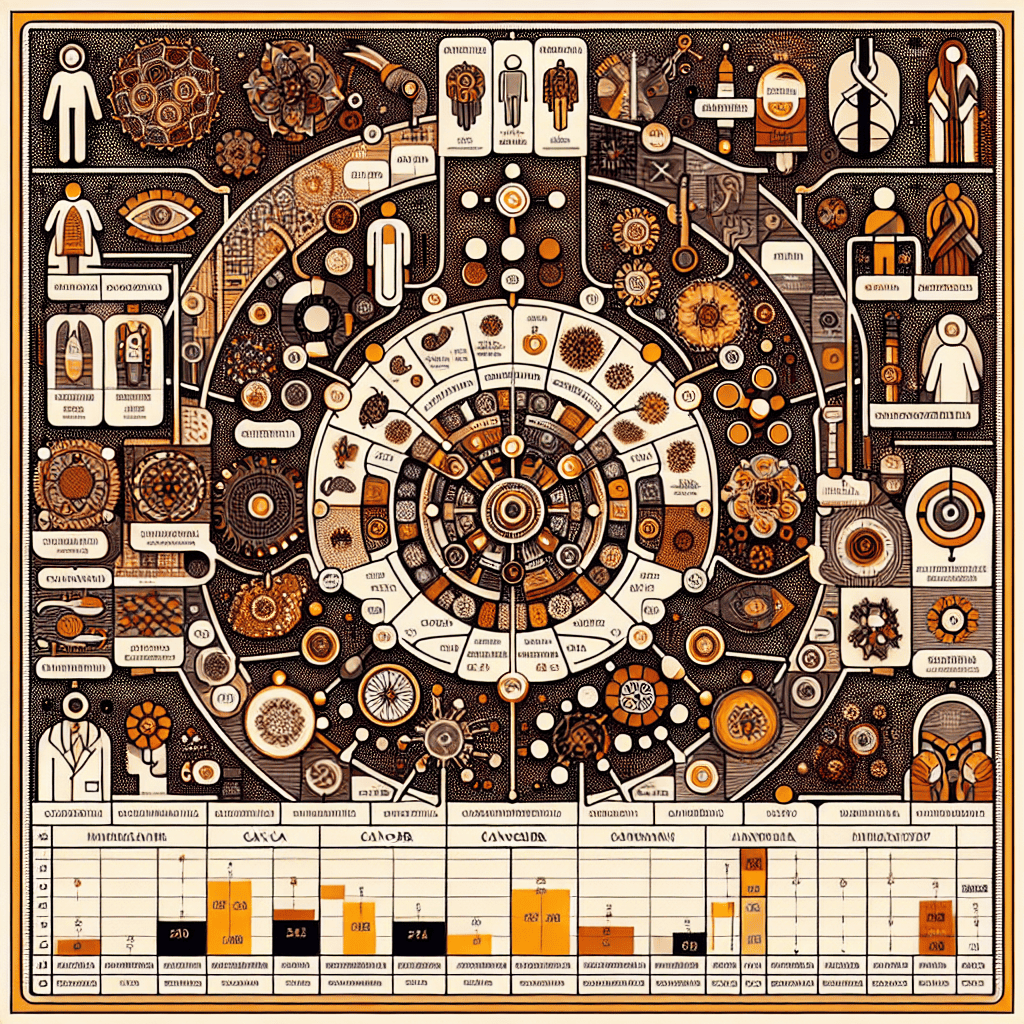Comprehensive Cancer Database for India Now Accessible

The launch of a comprehensive cancer database in India marks a significant milestone in the country’s fight against cancer. This database aims to provide a centralized repository of cancer-related data, facilitating research, improving patient care, and informing policy decisions. In this article, we delve into the various aspects of this groundbreaking initiative, exploring its potential impact on healthcare, research, and policy-making in India.
The Need for a Comprehensive Cancer Database in India
Cancer is a major public health concern in India, with millions of new cases diagnosed each year. Despite advancements in medical technology and treatment options, the country faces significant challenges in managing and controlling the disease. A comprehensive cancer database is crucial for addressing these challenges and improving outcomes for patients.
Rising Cancer Incidence in India
India has witnessed a steady increase in cancer incidence over the past few decades. According to the Indian Council of Medical Research (ICMR), the number of cancer cases in India is expected to rise from 1.39 million in 2020 to 1.57 million by 2025. This alarming trend underscores the need for a robust data collection system to monitor and manage the disease effectively.
Several factors contribute to the rising cancer incidence in India, including lifestyle changes, environmental pollution, and an aging population. The lack of awareness and early detection further exacerbates the problem, leading to late-stage diagnoses and poor survival rates. A comprehensive cancer database can help identify patterns and trends, enabling targeted interventions and prevention strategies.
Challenges in Cancer Data Collection
One of the primary challenges in cancer data collection in India is the lack of a standardized system for recording and reporting cases. Currently, data is collected from various sources, including hospitals, cancer registries, and research institutions. However, these sources often use different methodologies and formats, making it difficult to compile and analyze the data effectively.
Additionally, there is a significant gap in data coverage, with many rural and remote areas lacking access to cancer registries. This results in underreporting and incomplete data, hindering efforts to understand the true burden of cancer in the country. A comprehensive cancer database can address these challenges by providing a unified platform for data collection and analysis.
Benefits of a Centralized Cancer Database
A centralized cancer database offers numerous benefits for healthcare providers, researchers, and policymakers. By consolidating data from various sources, the database can provide a more accurate and comprehensive picture of cancer incidence and trends in India. This information is crucial for developing effective prevention and treatment strategies, as well as allocating resources efficiently.
For healthcare providers, access to a comprehensive cancer database can improve patient care by enabling more accurate diagnoses and personalized treatment plans. Researchers can use the data to identify risk factors, study disease patterns, and develop new therapies. Policymakers can leverage the information to design evidence-based policies and programs that address the specific needs of the population.
Case Study: Successful Implementation of Cancer Databases in Other Countries
Several countries have successfully implemented comprehensive cancer databases, providing valuable insights and lessons for India. For example, the Surveillance, Epidemiology, and End Results (SEER) Program in the United States has been instrumental in tracking cancer incidence and survival rates since 1973. The program’s data has been used to inform public health initiatives, guide research, and improve patient outcomes.
Similarly, the National Cancer Registry in the United Kingdom collects data on cancer diagnoses, treatments, and outcomes, enabling researchers and policymakers to monitor trends and evaluate the effectiveness of interventions. These examples highlight the potential benefits of a comprehensive cancer database and underscore the importance of investing in such initiatives.
Conclusion: The Urgent Need for Action
The establishment of a comprehensive cancer database in India is a critical step towards improving cancer care and outcomes in the country. By providing a centralized platform for data collection and analysis, the database can help address the challenges of rising cancer incidence, underreporting, and fragmented data systems. However, successful implementation will require collaboration between government agencies, healthcare providers, researchers, and other stakeholders.
As India moves forward with this initiative, it is essential to learn from the experiences of other countries and adapt best practices to the local context. With the right resources and commitment, a comprehensive cancer database can transform cancer care in India, ultimately saving lives and improving the quality of life for millions of patients.
Data Collection and Management: Building the Foundation
The success of a comprehensive cancer database hinges on effective data collection and management strategies. This section explores the key components of building a robust data infrastructure, including data sources, standardization, and technology integration.
Identifying Key Data Sources
To create a comprehensive cancer database, it is essential to identify and integrate data from various sources. These sources include:
- Hospitals and Clinics: Medical records from hospitals and clinics provide valuable information on cancer diagnoses, treatments, and outcomes. Collaborating with healthcare providers is crucial for ensuring accurate and timely data collection.
- Cancer Registries: Existing cancer registries, such as the National Cancer Registry Program (NCRP) in India, serve as important data sources. Expanding the coverage and capacity of these registries can enhance data quality and completeness.
- Research Institutions: Academic and research institutions conduct studies on cancer epidemiology, risk factors, and treatment outcomes. Integrating their findings into the database can provide valuable insights for research and policy-making.
- Government Health Programs: Data from government health programs, such as the National Health Mission and Ayushman Bharat, can offer information on cancer screening, prevention, and treatment initiatives.
- Private Sector Contributions: Collaborating with private healthcare providers and pharmaceutical companies can help capture data on cancer care and treatment innovations.
Standardizing Data Collection and Reporting
Standardization is a critical aspect of building a comprehensive cancer database. It ensures consistency and comparability of data across different sources and regions. Key steps in standardizing data collection and reporting include:
- Developing Uniform Data Definitions: Establishing clear definitions for key data elements, such as cancer types, stages, and treatment modalities, is essential for accurate data collection and analysis.
- Implementing Common Data Formats: Adopting standardized data formats and coding systems, such as the International Classification of Diseases (ICD) and Systematized Nomenclature of Medicine (SNOMED), facilitates data integration and interoperability.
- Training Healthcare Providers: Providing training and resources to healthcare providers on standardized data collection and reporting practices can improve data quality and reliability.
- Establishing Data Quality Assurance Mechanisms: Implementing quality assurance processes, such as data validation and auditing, helps ensure the accuracy and completeness of the data.
Leveraging Technology for Data Integration
Technology plays a vital role in integrating and managing data from diverse sources. Key technological solutions for building a comprehensive cancer database include:
- Electronic Health Records (EHRs): Implementing EHR systems in hospitals and clinics can streamline data collection and facilitate real-time data sharing with the central database.
- Data Warehousing and Analytics Platforms: Utilizing data warehousing and analytics platforms enables efficient storage, processing, and analysis of large volumes of data.
- Interoperability Standards: Adopting interoperability standards, such as Health Level Seven (HL7) and Fast Healthcare Interoperability Resources (FHIR), ensures seamless data exchange between different systems and platforms.
- Cloud Computing: Leveraging cloud computing solutions provides scalable and cost-effective infrastructure for storing and managing data.
- Data Security and Privacy Measures: Implementing robust data security and privacy measures, such as encryption and access controls, is essential for protecting sensitive patient information.
Case Study: India’s National Cancer Registry Program
The National Cancer Registry Program (NCRP) in India serves as a valuable example of data collection and management efforts in the country. Established in 1982, the NCRP collects data on cancer incidence, mortality, and survival from population-based and hospital-based registries across India.
The program has made significant strides in expanding its coverage and improving data quality over the years. For instance, the NCRP has implemented standardized data collection protocols and developed a centralized data management system to facilitate data integration and analysis. These efforts have resulted in more accurate and comprehensive cancer statistics, informing research and policy decisions.
Conclusion: Laying the Groundwork for Success
Effective data collection and management are foundational to the success of a comprehensive cancer database in India. By identifying key data sources, standardizing data collection practices, and leveraging technology, stakeholders can build a robust data infrastructure that supports research, patient care, and policy-making. As India embarks on this ambitious initiative, collaboration and commitment from all stakeholders will be essential to achieving its goals and improving cancer outcomes for the population.
Research and Innovation: Unlocking New Possibilities
The establishment of a comprehensive cancer database in India opens up new avenues for research and innovation. By providing access to a wealth of data, the database can drive advancements in cancer prevention, diagnosis, and treatment. This section explores the potential impact of the database on research and innovation in the field of oncology.
Enhancing Cancer Epidemiology Research
Cancer epidemiology research plays a crucial role in understanding the distribution and determinants of cancer in populations. A comprehensive cancer database can significantly enhance epidemiological research by providing detailed data on cancer incidence, prevalence, and survival rates across different regions and demographics.
Researchers can use this data to identify patterns and trends in cancer occurrence, such as variations in cancer types and stages across different geographic areas. This information is essential for developing targeted prevention and control strategies, as well as identifying high-risk populations for screening and early detection programs.
Moreover, the database can facilitate studies on the impact of lifestyle factors, environmental exposures, and genetic predispositions on cancer risk. By analyzing large datasets, researchers can uncover new risk factors and develop evidence-based recommendations for cancer prevention.
Advancing Precision Medicine and Personalized Treatment
Precision medicine aims to tailor medical treatment to the individual characteristics of each patient, taking into account their genetic makeup, lifestyle, and environment. A comprehensive cancer database can accelerate the development of precision medicine approaches by providing access to genomic and clinical data from diverse patient populations.
Researchers can use this data to identify genetic mutations and biomarkers associated with specific cancer types and treatment responses. This information can inform the development of targeted therapies and personalized treatment plans, improving patient outcomes and reducing adverse effects.
Additionally, the database can support clinical trials and research studies on novel therapies and treatment combinations. By facilitating patient recruitment and data sharing, the database can accelerate the translation of research findings into clinical practice.
Driving Innovation in Cancer Diagnostics
Accurate and timely diagnosis is critical for effective cancer management. A comprehensive cancer database can drive innovation in cancer diagnostics by providing data on diagnostic techniques, biomarkers, and imaging modalities used in clinical practice.
Researchers can analyze this data to evaluate the performance and cost-effectiveness of different diagnostic methods, identifying best practices and areas for improvement. This information can guide the development of new diagnostic tools and technologies, such as liquid biopsies and advanced imaging techniques.
Furthermore, the database can support research on early detection and screening programs, helping to identify optimal screening intervals and target populations. By improving early detection rates, these programs can lead to better treatment outcomes and reduced mortality.
Fostering Collaboration and Knowledge Sharing
A comprehensive cancer database can serve as a platform for collaboration and knowledge sharing among researchers, healthcare providers, and policymakers. By providing access to a centralized repository of data, the database can facilitate interdisciplinary research and foster partnerships between academic institutions, healthcare organizations, and industry stakeholders.
Collaborative research initiatives can leverage the database to address complex research questions and develop innovative solutions to cancer challenges. For example, multi-institutional studies can explore the effectiveness of different treatment protocols or investigate the impact of social determinants on cancer outcomes.
Moreover, the database can support knowledge dissemination and capacity building by providing training resources and tools for data analysis. By promoting a culture of collaboration and continuous learning, the database can drive progress in cancer research and care.
Conclusion: A Catalyst for Progress
The comprehensive cancer database in India has the potential to be a catalyst for research and innovation in oncology. By providing access to rich datasets and fostering collaboration, the database can drive advancements in cancer epidemiology, precision medicine, diagnostics, and more. As researchers and stakeholders harness the power of this resource, they can unlock new possibilities for improving cancer prevention, diagnosis, and treatment, ultimately benefiting patients and society as a whole.
Policy Implications: Informing Evidence-Based Decisions
The establishment of a comprehensive cancer database in India has significant policy implications, offering valuable insights for evidence-based decision-making. This section explores how the database can inform policy development, resource allocation, and public health initiatives to address the cancer burden in the country.
Guiding Cancer Prevention and Control Strategies
A comprehensive cancer database provides policymakers with critical data on cancer incidence, prevalence, and risk factors, enabling them to develop targeted prevention and control strategies. By analyzing trends and patterns in cancer occurrence, policymakers can identify high-risk populations and prioritize interventions that address their specific needs.
For example, data on tobacco-related cancers can inform tobacco control policies and programs, such as smoking cessation initiatives and public awareness campaigns. Similarly, information on lifestyle-related cancers can guide efforts to promote healthy behaviors, such as physical activity and balanced nutrition.
Moreover, the database can support the evaluation of existing prevention and control programs, helping policymakers assess their effectiveness and make data-driven decisions on program expansion or modification.
Optimizing Resource Allocation and Healthcare Planning
Effective resource allocation is essential for ensuring equitable access to cancer care and treatment. A comprehensive cancer database can provide policymakers with insights into the distribution of cancer cases and healthcare resources across different regions, enabling them to allocate resources more efficiently.
By identifying areas with high cancer incidence and limited healthcare infrastructure, policymakers can prioritize investments in healthcare facilities, workforce training, and diagnostic equipment. This targeted approach can help address disparities in access to care and improve outcomes for underserved populations.
Additionally, the database can inform healthcare planning by providing data on treatment patterns, outcomes, and costs. Policymakers can use this information to develop guidelines and protocols that optimize the use of healthcare resources and improve the quality of care.
Supporting Health Policy Research and Evaluation
The comprehensive cancer database can serve as a valuable resource for health policy research and evaluation. Researchers can use the data to study the impact of policy interventions on cancer outcomes, such as changes in screening rates, treatment adherence, and survival rates.
By conducting policy evaluations, researchers can identify best practices and lessons learned from successful initiatives, informing future policy development. For example, studies on the effectiveness of cancer screening programs can guide the design and implementation of new screening initiatives.
Furthermore, the database can support research on health system performance and efficiency, helping policymakers identify areas for improvement and implement evidence-based reforms.
Enhancing Public Health Surveillance and Response
A comprehensive cancer database can enhance public health surveillance and response by providing real-time data on cancer trends and outbreaks. This information is crucial for monitoring the impact of public health interventions and identifying emerging threats.
For instance, the database can support surveillance of cancer clusters and environmental exposures, enabling timely investigations and interventions. It can also facilitate the tracking of treatment outcomes and adverse events, helping to ensure patient safety and improve care quality.
Moreover, the database can inform public health communication strategies by providing data on public awareness and knowledge gaps. Policymakers can use this information to design targeted communication campaigns that raise awareness about cancer prevention, early detection, and treatment options.
Conclusion: Empowering Evidence-Based Policy-Making
The comprehensive cancer database in India has the potential to empower evidence-based policy-making by providing policymakers with the data and insights needed to address the cancer burden effectively. By guiding prevention and control strategies, optimizing resource allocation, supporting policy research, and enhancing public health surveillance, the database can contribute to improved cancer outcomes and a healthier population. As policymakers leverage this valuable resource, they can make informed decisions that benefit patients and society as a whole.
Patient Care and Support: Transforming the Cancer Journey
The comprehensive cancer database in India has the potential to transform patient care and support by providing healthcare providers with valuable insights and resources. This section explores how the database can enhance patient care, improve treatment outcomes, and support patients throughout their cancer journey.
Improving Diagnosis and Treatment Planning
Accurate diagnosis and effective treatment planning are critical components of cancer care. A comprehensive cancer database can provide healthcare providers with access to detailed data on cancer types, stages, and treatment modalities, enabling them to make informed decisions about patient care.
By analyzing data on diagnostic techniques and treatment outcomes, providers can identify best practices and develop evidence-based treatment protocols. This information can guide the selection of appropriate diagnostic tests and treatment options, improving the accuracy of diagnoses and the effectiveness of treatment plans.
Moreover, the database can support personalized treatment planning by providing data on patient characteristics, such as genetic mutations and comorbidities. Providers can use this information to tailor treatment plans to the individual needs of each patient, optimizing outcomes and minimizing adverse effects.
Enhancing Patient Monitoring and Follow-Up
Effective patient monitoring and follow-up are essential for ensuring treatment success and managing potential complications. A comprehensive cancer database can facilitate patient monitoring by providing real-time data on treatment progress, side effects, and outcomes.
Healthcare providers can use this data to track patient responses to treatment and make timely adjustments to treatment plans as needed. This proactive approach can help prevent complications and improve patient outcomes.
Additionally, the database can support follow-up care by providing data on long-term outcomes and survivorship. Providers can use this information to develop follow-up protocols that address the specific needs of cancer survivors, such as monitoring for recurrence and managing late effects of treatment.
Supporting Patient Education and Empowerment
Patient education and empowerment are key components of patient-centered care. A comprehensive cancer database can support patient education by providing access to reliable information on cancer prevention, diagnosis, treatment, and survivorship.
Healthcare providers can use this information to educate patients about their condition and treatment options, helping them make informed decisions about their care. By empowering patients with knowledge, providers can enhance patient engagement and adherence to treatment plans.
Moreover, the database can support patient empowerment by providing tools and resources for self-management. For example, patients can access information on lifestyle modifications, symptom management, and coping strategies, helping them take an active role in their care.
Facilitating Access to Support Services
Cancer patients often require access to a range of support services, including psychological counseling, nutritional support, and rehabilitation. A comprehensive cancer database can facilitate access to these services by providing data on available resources and referral pathways.
Healthcare providers can use this information to connect patients with appropriate support services, ensuring they receive comprehensive care throughout their cancer journey. This holistic approach can improve patient well-being and quality of life.
Additionally, the database can support the development of support programs by providing data on patient needs and preferences. Policymakers and healthcare organizations can use this information to design programs that address the specific needs of cancer patients and their families.
Conclusion: Transforming Patient Care and Support
The comprehensive cancer database in India has the potential to transform patient care and support by providing healthcare providers with valuable insights and resources. By improving diagnosis and treatment planning, enhancing patient monitoring and follow-up, supporting patient education and empowerment, and facilitating access to support services, the database can enhance the quality of care and improve outcomes for cancer patients. As healthcare providers leverage this valuable resource, they can provide patient-centered care that addresses the unique needs of each individual, ultimately transforming the cancer journey for patients and their families.
Conclusion: A New Era in Cancer Care in India
The launch of a comprehensive cancer database in India marks a new era in cancer care, offering unprecedented opportunities for research, innovation, policy-making, and patient support. By providing a centralized repository of cancer-related data, the database can drive advancements in cancer prevention, diagnosis, and treatment, ultimately improving outcomes for patients across the country.
The database’s potential impact is far-reaching, from enhancing cancer epidemiology research and precision medicine to informing evidence-based policy decisions and transforming patient care. As stakeholders collaborate to harness the power of this resource, they can unlock new possibilities for addressing the cancer burden in India and improving the quality of life for millions of patients.
However, realizing the full potential of the comprehensive cancer database will require ongoing commitment and collaboration from government agencies, healthcare providers, researchers, and other stakeholders. By working together to build a robust data infrastructure, standardize data collection practices, and leverage technology, stakeholders can ensure the success of this ambitious initiative.
As India embarks on this journey, it is essential to learn from the experiences of other countries and adapt best practices to the local context. With the right resources and commitment, a comprehensive cancer database can transform cancer care in India, ultimately saving lives and improving the quality of life for millions of patients.





